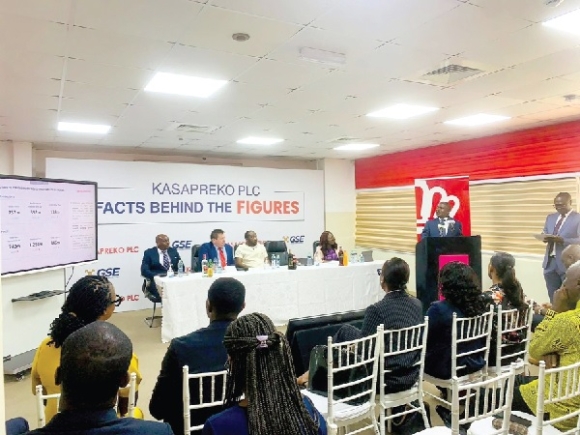The Managing Director of the Ghana Stock Exchange (GSE), Abena Amoah, has called on financial institutions to support equity growth for local businesses, moving beyond the traditional debt financing model.
According to her, the current financing model discourages long-term business building and innovation, as entrepreneurs often see limited returns despite their sacrifices and risk-taking efforts. She noted that the over-reliance on debt financing has left many businesses highly leveraged, limiting the value available to founders and shareholders.
The GSE is promoting equity market participation as an alternative to debt financing, aiming to support the creation of generational wealth and sustainable businesses."We must build systems that reward innovation and ownership," Ms Amoah emphasized.
"If we continue to undervalue the work of entrepreneurs, we risk discouraging innovation and reducing the appetite for long-term business building."Using the example of the late Dr. Kwabena Adjei, Founder of Kasapreko Company Limited, Ms Amoah highlighted the potential of equity growth.
After 36 years of operations, Kasapreko achieved shareholders' funds of GH¢386 million and employs over 2,000 people. She questioned whether banks and financial institutions have adequately served local entrepreneurs who have spent decades building businesses and creating jobs.
"Our financing institutions must ask themselves if they have served businesses like this well. It is not fair that an entrepreneur's life work only amounts to this modest equity value after decades of sacrifice.”
“Too many of the entrepreneurs work only for the banks and we are here to change the story. It is not a zero-sum game; it is a game that everyone must earn and win at. Banks must win, the shareholders and entrepreneurs must also benefit from their investment and their creativity,” she stated at the GSE “Facts Behind the Figures" event in Accra
Listing
In a presentation, the Chief Executive of Kasapreko PLC, Richard Adjei, revealed that the company plans to list about 25 per cent equity shares on the main market of GSE to increase growth and scale up investments across the continent.
He disclosed that the board has given approval for listing equity shares on the main market by the end of 2025.
“Coming unto the bond market was very historic for us as a local beverage company and we are glad for the support received so far this year. Thanks to the board and the investors, we have received approval to list equities on the main market.”
Thanks to GSE for pushing us to achieve this and also to our arrangers, we believe that we have to get more shareholders so we can take advantage of bigger markets,” he said.
Performance
He reaffirmed the company’s commitment to market transparency and investor engagement.
He said since its landmark corporate bond issuance in 2024, the largest by a local company in Ghana’s history at GH¢350 million, Kasapreko has set a new standard for private-sector participation in the public debt capital market.
“Our entry into the debt capital market was more than a financing move, it was a bold statement. We embraced accountability, demonstrated strong governance, and proved that a home-grown Ghanaian brand could excel under public scrutiny while delivering value to investors,” he stated.
The country’s leading beverage manufacturer maintained an impressive growth trajectory since its listing, with 2024 revenue growing by 45 per cent year-on-year to GH¢2.7 billion, driven by strong domestic sales and rising export demand.
Net profit also surged to 574 per cent, underscoring operational efficiency. This momentum continued into Q1-2025, with revenue up 52 per cent and profit after tax climbing 184 per cent, driven by sustained volume growth and disciplined cost management.
“Investor confidence in Kasapreko continues to grow. The company achieved tighter pricing on its second tranche, a testament to growing market confidence in its operations. Kasapreko is practicing prudent financial management, reducing interest-bearing liabilities and actively managing working capital to support the growth of its operations,” Mr Adjei stated.
